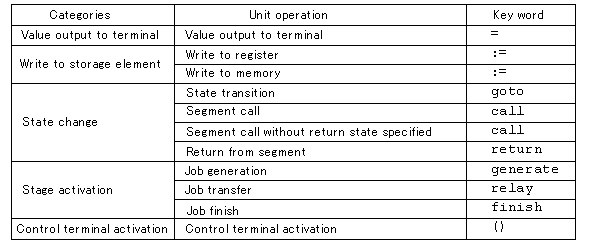
There are five categories of unit operation, which are further classified into eleven types as listed in Table 3.3.
When data is written into registers or memory or when values are output to terminals, the bit widths must be equal at each side of the operation.
"State transition" and "segment call" are valid only in a state of a stage or in a state of a segment. If the state name of the state after transition and the state name of a return state are described in a stage, they must be state names in that stage. If they are described in a segment, they must be state names in that segment. The callable segment name must be the segment name in that stage.
"Segment call without return state specified" and "return from segment" are valid only in a segment state.
"Job generation" is valid only at a control terminal or a stage. "Job relay" and "job finish" are valid only in a stage. This is because there is no job to relay at a control terminal.
A control terminal is activated as follows:
chk ();
Parentheses () cannot be omitted even if there is no argument.
<Table 3.3> Types of unit operation
